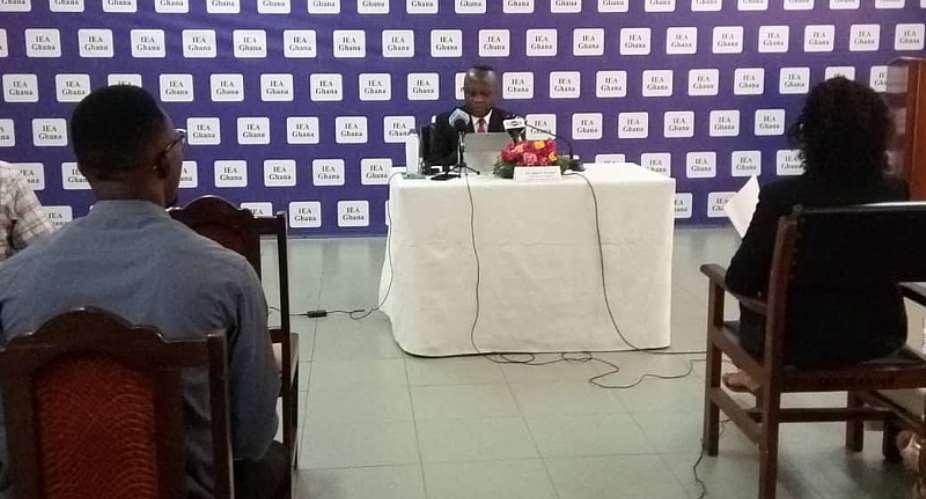The Institute of Economic Affairs (IEA), has described the 2020 Budget as being cautious but not sufficiently ambitious.
According to IEA, the Budget focused more on economic stabilization or consolidation rather than revenue mobilization and expenditure.
That, it said, has serious impact on economic growth.
Director of Research, Dr. John Quarshie, made this known at a press conference held by IEA on Tuesday, November 19, 2019.
Finance Minister, Ken Ofori-Atta, presented the 2020 Budget Statement and Economic Policy on Wednesday, November 13, 2019.
He projected GH¢ 67.1 (16. 9℅ of GDP) billion as total revenue and grants for 2020.
The amount represents an upward projected outturn for 2019 of GH¢ 54.6 billion (15.8℅ of GDP).
He said domestic Revenue is estimated at GH¢65.8 billion, representing an annual growth of 22.5 percent over the projected outturn for 2019. Grants disbursement from Development Partners is estimated at GH¢1.2 billion (0.3% of GDP) and a nominal growth of 48.8 percent over the projected outturn of GH¢833.2 million in 2019.
Targets
He noted that “the following macroeconomic targets are set for the medium term (2020-2023): Overall Real GDP growth to average 5.7 percent for the period; Non-Oil Real GDP to grow at an average of 5.9 percent for the period;
Inflation to be within the target band of 8±2 percent; Overall fiscal deficit to remain within the Fiscal Responsibility Act Threshold of not more than 5 percent of GDP; the primary balance to be in a surplus; andGross International Reserves to cover at least 3.5 months of imports of goods and services.”
He added that based on the overall macroeconomic objective of “Consolidating the Gains for Growth, Jobs, and Security”, the following specific macroeconomic targets have been set for the 2020 fiscal year:
Overall Real GDP growth of 6.8 percent;
Non-Oil Real GDP growth of 6.7 percent;
End-period inflation of 8.0 percent;
Fiscal deficit of 4.7 percent of GDP;
Primary surplus of 0.8 percent of GDP; and Gross International Reserves to cover not less than 3.5 months of imports of goods and services.
IEA’s View
Dr. Quarshie noted that Government should have considered raising some taxes, especially in the banking sector.
He stressed that “you need to mobilize more resources to support national development.”
He stated that the revenue effort is not that ambitious and that it has constrained the expenditure aspect.
He added that over the last three years capital expenditure has been depressed, reason for the bad roads and schools.
“Our reading of the budget shows that the allocation of the budget allocation for infrastructure will still not be enough,” he lamented.
According to him, if care was not taken the economy could fall in the sub-optimal equilibrium level.
He bemoaned that over the last few years, Government has been trying to consolidate the economy due to the 2016 overrun.
---Daily Guide





 We’ll no longer tolerate your empty, unwarranted attacks – TUC blasts Prof Adei
We’ll no longer tolerate your empty, unwarranted attacks – TUC blasts Prof Adei
 Bawumia donates GHc200,000 to support Madina fire victims
Bawumia donates GHc200,000 to support Madina fire victims
 IMF to disburse US$360million third tranche to Ghana without creditors MoU
IMF to disburse US$360million third tranche to Ghana without creditors MoU
 Truck owner share insights into train collision incident
Truck owner share insights into train collision incident
 Paramount chief of Bassare Traditional Area passes on
Paramount chief of Bassare Traditional Area passes on
 Two teachers in court over alleged illegal possession of BECE papers
Two teachers in court over alleged illegal possession of BECE papers
 Sunyani: Victim allegedly shot by traditional warriors appeals for justice
Sunyani: Victim allegedly shot by traditional warriors appeals for justice
 Mahama vows to scrap teacher licensure exams, review Free SHS policy
Mahama vows to scrap teacher licensure exams, review Free SHS policy
 Government will replace burnt Madina shops with a new three-story, 120-store fac...
Government will replace burnt Madina shops with a new three-story, 120-store fac...
